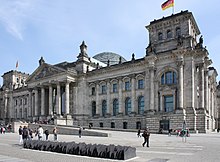Albert Funk (politician)
Albert Albin Funk (born October 15, 1894 in Zwickau , † April 27, 1933 in Recklinghausen ) was a German politician and resistance fighter .
Life
Albert Funk came from a family of miners. After a time as a laborer, he became a miner himself. In 1913 he joined the miners' union . During the First World War , he did military service before he was reported as a miner in 1917 and worked in Zwickau. In 1918 he joined the USPD .
He came to Ahlen in Westphalia as a miner in 1918 . Funk became a functionary of the union of manual and mental workers . At his colliery he became the works council chairman and headed the local action committee during the Kapp Putsch . Dismissed by his employer, protests by the workforce forced him to be re-employed. He was later head of the KPD local group in Herringen and chairman of the works council of the Heinrich-Robert colliery .
In 1929 he was expelled from the old association and became a full-time functionary of the communist revolutionary trade union opposition . He became a member of the Reich leadership of this organization and had been responsible for works council work since 1930.
Funk was elected to the Reichstag on September 14, 1930 , to which he was a member until 1932. In January 1931 he became chairman of the Union of Miners in Germany as part of the RGO. In November 1932 he took over the management of the Dortmund subdistrict of the KPD .
After the " seizure of power " by the National Socialists, Funk was arrested in Dortmund on April 16, 1933, transferred to Recklinghausen police headquarters on April 27, where he was interrogated and mistreated.
In October 1949 it was clear to the Bochum regional court that "F. [unk] rushed into the courtyard from the 3rd floor of the police headquarters under the influence of the physical and psychological agony he had suffered." Funk survived the fall and died on same day in the Prosper Hospital. In 1949, the Bochum court sentenced the Gestapo officer responsible for the interrogation to twelve years in prison for crimes against humanity, extortion of testimony and bodily harm in office in 46 cases each.
Honors
- In the GDR , the mining and smelting combine "Albert Funk" Freiberg existed until 1990 , which was active in ore mining, processing and smelting. The affiliated BSG also had Funk's name.
- Until 2004, the "Albert Funk" elementary school was located on Albert-Funk-Strasse in Zwickau.
- In Stralsund there was the company vocational school "Albert Funk" of the VEB Erdöl-Erdgas Grimmen .
- According to Albert Funk, Aue in the cell district, in Freiberg in the Donatsviertel, in the nearby Halsbrücke , in Hamm in the Herringen district, in Oelsnitz / Erzgeb. as well as in Zwickau in the district Eckersbach streets.
- Since 1992 one of the 96 memorial plaques for members of the Reichstag murdered by the National Socialists has been commemorating Albert Funk in Berlin near the Reichstag .
- A stumbling block in the courtyard of the police headquarters in Recklinghausen has been a reminder of Albert Funk since 2018 .
literature
- Katja Haferkorn: Funk, Albert. In: History of the German labor movement. Biographical Lexicon . Dietz Verlag, Berlin 1970, pp. 146–147.
- Erwin Dickhoff: Essen heads: who was what? Bacht, Essen 1985, ISBN 3-87034-037-1 .
- Funk, Albert . In: Hermann Weber , Andreas Herbst (ed.): German communists. Biographical Handbook 1918 to 1945 . 2nd, revised and greatly expanded edition. Dietz, Berlin 2008, ISBN 978-3-320-02130-6 .
- Ortwin Bickhove-Swiderski: Albert Funk: Bergarbeiter und Kommunist , Laumann Druck und Verlag, Dülmen, 2017, ISBN 978-3-89960-464-1 .
Web links
- Albert Funk in the database of members of the Reichstag
- Albert Funk (1894–1933) , printed matter No. 2 of the DKP district organization Recklinghausen. (PDF, 666 kB)
Individual evidence
- ↑ Summary of the judgment in: Martin Schumacher (Ed.): MdR The Reichstag members of the Weimar Republic in the time of National Socialism. Political persecution, emigration and expatriation 1933-1945. Droste-Verlag, Düsseldorf 1991, ISBN 3-7700-5162-9 , p. 227f.
| personal data | |
|---|---|
| SURNAME | Funk, Albert |
| ALTERNATIVE NAMES | Funk, Albert Albin (full name) |
| BRIEF DESCRIPTION | German politician (KPD), MdR and resistance fighter |
| DATE OF BIRTH | October 15, 1894 |
| PLACE OF BIRTH | Zwickau |
| DATE OF DEATH | April 27, 1933 |
| Place of death | Recklinghausen |

